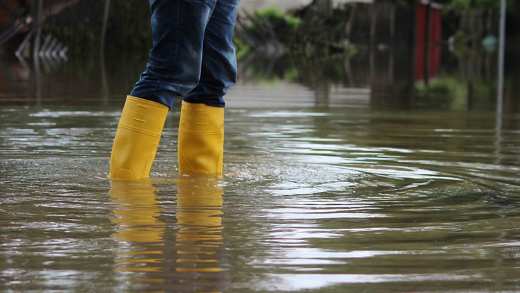Helping you prepare for future flooding
When a flood warning sounds it means that flooding is expected and you need to act fast.

We understand the devastation that flooding can cause. Sadly, flood risk in the UK is increasing and if your home has flooded once, you may be more likely to flood again in the future.
Before we even get to the 10-part plan of an active flood warning, one of the easiest ways to assess your flood risk is by checking the flood map links relevant to your area.
England: Flood risk summary - Check your long-term flood risk - GOV.UK
NI: Flooding risk in Northern Ireland
Wales: Natural Resources Wales / Check your flood risk by postcode
Scotland: Flood maps | Beta | SEPA | Scottish Environment Protection Agency Footnote [1]
Sign up to flood warnings and create a plan
Sign up to flood warnings here: Scotland | Wales | England
Floods can happen quickly & strike at any time of day, night, or year. Having a plan in place will help you be better prepared to respond in an emergency - reducing the impacts of flooding and helping you to recover from it.
Resilico Connect is a free mobile app which enables you to get flood alerts and create a flood plan directly on your mobile. It's available on iOS and Android phones. If you use this code 1696-0000-2025 when signing up you can anonymously participate in research into people's preparedness for flooding.

Get the Resilico Connect App
Make a personalised flood plan on your phone, get real-time alerts for risks near your home, and stay prepared with helpful maintenance reminders - all in one place.

BeFloodReady
BeFloodReady provides guidance and information on how you can prepare your home for a flood, including a flood plan template and tips on what to pack in your flood kit, as well as information and guidance on Property Flood Resilience measures.
10 things you should do immediately when there's a flood warning
Before a flood
1. Move things to a safe spot
Some of your most treasured household items could be at risk of water damage and electric items can become an electrocution risk if they come into contact with water. Electrical items like TVs should be moved above ground level, while heavier items like fridges and freezers could be raised up on bricks if possible, to keep the electrical circuits above potential flood level and make the property as safe as possible.
We also recommend moving furniture, valuables, and important documents to somewhere safer. Only move things you can easily manage yourself or ask for help, you wouldn’t want to injure yourself for the sake of an armchair.
If you have a vehicle then move it to higher ground to avoid the floodwaters.
2. Try to stop water from getting in
Thwart the flood by laying sandbags at entry points such as doors. If you don’t have any to hand, then a pillowcase or plastic bag filled with garden soil can be used as an alternative. You should also put plugs in sinks and baths and weigh them down with something heavy to prevent sewage water backflowing into your home. And remember, shut and lock all windows and doors.
3. Alert your neighbours
You can make sure everyone knows there is a flood on the way, and what the plan is – especially old or unwell neighbours.
Floods can strike anytime, so having a plan is key.
4. Grab some essentials
By this point you should have moved your most precious items out of the reach of flood water, but you’ll want to keep more practical things closer to hand- things like a torch, batteries, medicine and personal documents.
During a flood
5. Turn off your gas, electricity, and water supplies
This can prevent damage to the systems and reduce the risk of gas leaks, electrocution, and a polluted or depleted water supply. If you’re unsure on how to do this, then ask your supplier in advance – you can mark taps and switches with stickers to help you remember.
6. Avoid the water
This may be stating the obvious, but flood water is dangerous as it can be fast flowing and contaminated with sewage. Avoid walking or driving through it and wash your hands thoroughly if you touch it.
7. Evacuate when told to do so
Listen to the advice of the emergency services. If they tell you to evacuate your home, then you should immediately.
After a flood
8. Contact your insurer as soon as possible
If you need to claim on your home insurance, get the process started immediately. Identify damaged items - make a list and take photos of any damage and the flood water line if you can – this makes it easier to assess the damage and speed up your claim.
Find out more about how to make a claim and what you need.
We know how difficult a time it can when your home is hit by a flood, and we’ll be by your side through the claims process and beyond. Insurers can usually help with the drying out process for your home, suggestions so you can minimise further damage, and help with emergency accommodation, if needed.
9. Avoid touching electrics
Plugs, sockets, and electrical appliances could have been damaged by the water and can be dangerous. Wait until someone who’s qualified tells you they’re ok to use again.
10. Dry out your house
If water has come into your home, then you need to dry it out – there are a number of professional services out there that can help with this. Dehumidifiers can also help speed up the process.

Ready to get Aviva Signature home insurance cover?
Aviva home insurance protects your home inside and out – covering your building and belongings.

